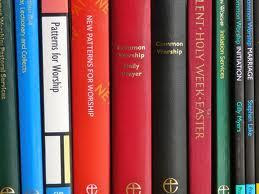You've gone to buy a simple thing that you need. You decide to shop around a little. You go to half a dozen stores and find that in each of them there are lots of different types of the thing you want. By the time you get to the last shop you'll got umpteen choices facing you; not only different types of the same thing but also permutations of cost, packaging and associated purchases. You return home empty-handed: you've been unable to choose. I have to admit that happens to me often.
What I describe is decision paralysis. Choice doesn't necessarily free us, it often stops us making a decision. Decision paralysis in effect often leaves us with the status quo because even the best of decisions are blocked. It freezes us where we are and with what we've got. Yes, it may be irrational but it's a very common reaction to extensive choice. Choice can be a tyranny rather than a liberation.
 The Church of England used to have one book as the foundation of its worshipping life. I remember individual's bringing their own copies of The Book of Common Prayer week by week to worship. When the Alternative Service Book came along (1980) everthing necessary was still largely in one book, though rather fatter it has to be admitted. A much smaller proportion of worshippers brought their own book with them. Nowadays it's all but impossible: there's simply too many books to chose from and anyway the leaders of worship will have made their own choices that won't necessarily be obvious until you're there. This proliferation of choice is usually commended as a great advance, but I wonder. It's certainly often hard to identify what's common in Common Worship. That doesn't necessarily mean that the strands of a common heritage aren't there, it's just that they are hard to latch-on to. It's difficult for the common person to see and feel what's common or communal in the variety. And that difficulty erodes the sense of belonging beyond the confines of the familiar congregation. Emblazoning the Church of England logo on Powerpoint screens or booklet covers doesn't make up for the loss.
The Church of England used to have one book as the foundation of its worshipping life. I remember individual's bringing their own copies of The Book of Common Prayer week by week to worship. When the Alternative Service Book came along (1980) everthing necessary was still largely in one book, though rather fatter it has to be admitted. A much smaller proportion of worshippers brought their own book with them. Nowadays it's all but impossible: there's simply too many books to chose from and anyway the leaders of worship will have made their own choices that won't necessarily be obvious until you're there. This proliferation of choice is usually commended as a great advance, but I wonder. It's certainly often hard to identify what's common in Common Worship. That doesn't necessarily mean that the strands of a common heritage aren't there, it's just that they are hard to latch-on to. It's difficult for the common person to see and feel what's common or communal in the variety. And that difficulty erodes the sense of belonging beyond the confines of the familiar congregation. Emblazoning the Church of England logo on Powerpoint screens or booklet covers doesn't make up for the loss. Collective memory mechanism:
Memory needs a sense of belonging that's easily linked to 'things' whether they be actual objects or identifiable ways of behaving. Memories need to be located.


No comments:
Post a Comment